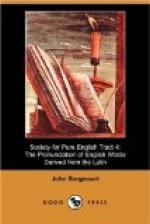Fan[’a]tic Egypt and her priests.
As for ‘unique’ it is a modern borrowing from French, and of late ‘[’a]ntique’ or ‘[’a]ntic’, as Shakespeare has it, has followed in one of its senses the French use. It is a pity in face of Milton’s
With mask and [’a]ntique Pageantry,
and it obscures the etymological identity of ‘antique’ and ‘antic’, but the old pronunciation is irredeemable. At least the new avoids the homophonic inconvenience.
Greek words of this class used as adjectives mostly follow the same rule, as ‘sporadic’, ‘dynamic’, ‘pneumatic’, ‘esoteric’, ‘philanthropic’, ‘emetic’, ‘panegyric’. As nouns the earlier introductions threw the stress back, as ‘heretic’, ‘arithmetic’, but later words follow the adjectives, as ‘emetic’, ‘enclitic’, ‘panegyric’. As for ‘politic’, which is stressed as we stress both by Shakespeare and by Milton, it must be under French influence, though Skeat seems to think that it came straight from Latin.
STEMS IN -OS. These words agree in being disyllabic, but otherwise they are a tiresome and quarrelsome people. For their diversity in spelling some can make a defence, since ‘horror’, ‘pallor’, ‘stupor’ came straight from Latin, but ‘tenor’, coming through French, should have joined hands with ‘colour’, ‘honour’, ‘odour’. The short vowel is inevitable in ‘horror’ and ‘pallor’, the long in ‘ardour’, ‘stupor’, ‘tumour’. The rest are at war, ‘clamour’, ‘colour’, ‘honour’, ‘dolour’, ‘rigour’, ‘squalor’, ‘tenor’, ‘vigour’ in the short legion, ‘favour’, ‘labour’, ‘odour’, ‘vapour’ in the long. Their camp-followers ending in -ous are under their discipline, so that, while ‘cl[)a]morous’, ‘r[)i]gorous’, ‘v[)i]gorous’ agree with the general rule, ‘[=o]dorous’ makes an exception to it. All the derivatives of favor are exceptions to the general rule, for ‘favourite’ and ‘favorable’ keep its long a. Of course ‘l[)a]b[=o]rious’ is quite in order, and so is ‘v[)a]pid’.
STEMS IN -TOR AND -SOR. These words, when they came through French, threw the stress back and shortened the penultimate, [=o]r[=a]torem becoming orateur, and then ‘[)o]r[)a]tor’, with the stress on the antepenultimate. Others of the same type are ‘auditor’, ‘competitor’, ‘senator’, and Shelley has
The sister-pest, congr[’e]gator of slaves,
while ‘amateur’ is borrowed whole from French and stresses its ultima. Trisyllables of course shorten the first vowel, as ‘cr[)e]ditor’, ‘j[)a]nitor’. Polysyllables follow the stress of the verbs; thus ‘[’a]gitate’ gives ‘[’a]gitator’ and ‘comp[’o]se’ gives ‘comp[’o]sitor’. To the first class belongs ‘circulator’, ‘educator’, ‘imitator’, ‘moderator’, ‘negotiator’, ‘prevaricator’, with which ‘gladiator’ associates itself; to the second belongs ‘competitor’. Words which came straight from Latin keep the stress of the Latin nominative, as ‘creator’, ‘spectator’, ‘testator’, ‘coadjutor’, ‘assessor’, to which in Walton’s




